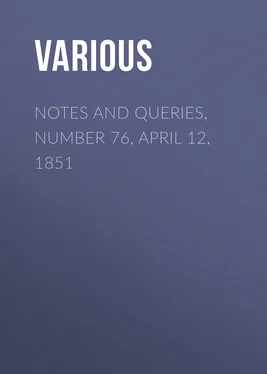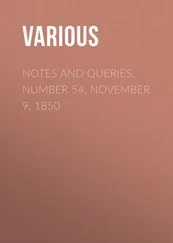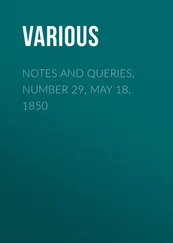Various - Notes and Queries, Number 76, April 12, 1851
Здесь есть возможность читать онлайн «Various - Notes and Queries, Number 76, April 12, 1851» — ознакомительный отрывок электронной книги совершенно бесплатно, а после прочтения отрывка купить полную версию. В некоторых случаях можно слушать аудио, скачать через торрент в формате fb2 и присутствует краткое содержание. Жанр: foreign_antique, periodic, foreign_edu, на английском языке. Описание произведения, (предисловие) а так же отзывы посетителей доступны на портале библиотеки ЛибКат.
- Название:Notes and Queries, Number 76, April 12, 1851
- Автор:
- Жанр:
- Год:неизвестен
- ISBN:нет данных
- Рейтинг книги:3 / 5. Голосов: 1
-
Избранное:Добавить в избранное
- Отзывы:
-
Ваша оценка:
- 60
- 1
- 2
- 3
- 4
- 5
Notes and Queries, Number 76, April 12, 1851: краткое содержание, описание и аннотация
Предлагаем к чтению аннотацию, описание, краткое содержание или предисловие (зависит от того, что написал сам автор книги «Notes and Queries, Number 76, April 12, 1851»). Если вы не нашли необходимую информацию о книге — напишите в комментариях, мы постараемся отыскать её.
Notes and Queries, Number 76, April 12, 1851 — читать онлайн ознакомительный отрывок
Ниже представлен текст книги, разбитый по страницам. Система сохранения места последней прочитанной страницы, позволяет с удобством читать онлайн бесплатно книгу «Notes and Queries, Number 76, April 12, 1851», без необходимости каждый раз заново искать на чём Вы остановились. Поставьте закладку, и сможете в любой момент перейти на страницу, на которой закончили чтение.
Интервал:
Закладка:
Various
Notes and Queries, Number 76, April 12, 1851 / A Medium of Inter-communication for Literary Men, Artists, Antiquaries, Genealogists, etc
Notes
COULD SHAKESPEARE HAVE DESIGNATED CLEOPATRA "YOND RIBALD-RID NAG OF EGYPT?"
To judge of this question fairly, it will be necessary to cite the passage in which it occurs, as it stands in the folio, Act III. Sc. 8., somewhat at large.
" Eno. Naught, naught, all naught! I can behold no longer;
Th' Antoniad, the Egyptian admiral,
With all their sixty, fly, and turn the rudder;
To see't, mine eyes are blasted.
Enter Scarus.
Scar. Gods and goddesses, all the whole synod of them!
Eno. What's the passion?
Scar. The greater cantle of the world is lost
With very ignorance; we have kiss'd away
Kingdoms and provinces.
Eno. How appears the fight?
Scar. On our side like the token'd pestilence,
Where death is sure. Yond ribaudred Nagge of Egypt,
Whom leprosy o'ertake, i' the midst o' the fight
When vantage like a pair of twins appear'd,
Both as the same, or rather ours the elder,
The Breeze upon her, like a cow in June,
Hoists sail and flies.
Eno. That I beheld:
Mine eyes did sicken at the sight, and could not
Endure a further view.
Scar. She once being loof'd,
The noble ruin of her magick, Antony,
Claps on his sea-wing, and, like a doting mallard,
Leaving the fight in height, flies after her;
I never saw an action of such shame;
Experience, manhood, honour, ne'er before
Did violate so itself.
Eno. Alack, alack!"
The notes in the variorum edition begin by one from Johnson, in which he says:
"The word is in the old edition ribaudred , which I do not understand, but mention it in hopes that others may raise some happy conjecture."
Then Steevens, after having told us that a ribald is a lewd fellow , says:
" Ribaudred , the old reading, is I believe no more than a corruption. Shakspeare, who is not always very nice about his versification, might have written,
'Yon ribald-rid nag of Egypt'—
i.e. Yon strumpet, who is common to every wanton fellow."
Malone approves Steevens's ribald-rid , but adds,
"By ribald , Scarus, I think, means the lewd Antony in particular, not every lewd fellow."
Tyrwhitt saw the necessity of reading hag instead of nag , and says what follows seems to prove it:
"She once being loof'd,
The noble ruin of her magick, Antony,
Claps on his sea-wing."
It is obvious that the poet would not have made Scarus speak of Antony as the noble ruin of Cleopatra's magick, and of his manhood and honour, and in the same breath designate him as a ribald. He would be much more likely to apply the epithet lewd hag to such an enchantress as Cleopatra, than that of ribald-rid nag , which I feel convinced never entered the imagination of the poet.
Imperfect acquaintance with our older language has been too frequently the weak point of the commentators; and we see here our eminent lexicographer confessing his ignorance of a word which the dictionaries of the poet's age would have enabled him readily to explain. For although we have not the participle ribaudred , which may be peculiar to the poet, in Baret's Alvearie we find " Ribaudrie , vilanie in actes or wordes, filthiness, uncleanness"—"A ribaudrous and filthie tongue, os obscœnum et impudicum:" in Minsheu, ribaudrie and ribauldrie , which is the prevailing orthography of the word, and indicates its sound and derivation from the French, rather than from the Italian ribalderia .
That nagge is a misprint for hagge , will be evident from the circumstance, that in the first folio we have a similar error in the Merry Wives of Windsor , Act IV. Sc. 2., where instead of "you witch, you hagge ," it is misprinted "you witch, you ragge ." It is observable that hagge is the form in which the word is most frequently found in the folios, and it is the epithet the poet applies to a witch or enchantress.
I cannot, therefore, but consider the alteration of the text by Steevens as one of the most violent and uncalled-for innovations of which he has been guilty; and he himself seems to have had his misgivings, for his observation that Shakspeare "is not always very nice about his versification" was meant as an apology for marring its harmony by the substitution of ribald-rid for the poet's own ribaudred .
It is to me a matter of surprise that Mr. Collier and Mr. Knight, in their laudable zeal for adherence as closely as possible to the old copies, should not have perceived the injury done both to the sense and harmony of the passage by this unwarrantable substitution.
S. W. Singer.BROWNE'S BRITANNIA'S PASTORALS
I have lately been amusing myself by reading the small volume with this title published in Clarke's Cabinet Series , 1845.
Among the many pleasing passages that I met with in its pages, two in particular struck me as being remarkable for their beauty; but I find that neither of them is cited by either Ellis or Campbell. (See Ellis, Specimens of the Early English Poets , 4th edition, corrected, 1811; and the Campbell, Specimens of the British Poets , 1819.)
Indeed Campbell says of Browne:
"His poetry is not without beauty; but it is the beauty of mere landscape and allegory, without the manners and passions that constitute human interest."—Vol. iii. p. 323.
Qualified by some such expression as— too often—generally—in almost every instance ,—the last clause might have passed,—standing as it does, it appears to me to give anything but a fair idea of the poetry of the Pastorals . My two favourites are the "Description of Night"—
"Now great Hyperion left his golden throne," &c.,
(consisting of twenty-six lines)—book ii. song 1. (Clarke, p. 186.) and the "Lament of the Little Shepherd for his friend Philocel"—
"With that the little shepherd left his task," &c.,
(forty-four lines)—book ii. song 4. (Clarke, p. 278.)
If you will allow me to quote a short extract from each passage, it may enable the reader to see how far I am justified in protesting against Campbell's criticism; and I will then try to support the pretensions of the last, by showing that much of the very same imagery that it contains is to be found in other writings of acknowledged merit:—
"And as Night's chariot through the air was driven,
Clamour grew dumb, unheard was shepherd's song,
And silence girt the woods: no warbling tongue
Talk'd to the echo; satyrs broke their dance,
And all the upper world lay in a trance.
Only the curlëd streams soft chidings kept,
And little gales that from the green leaf swept
Dry summer's dust, in fearful whisp'rings stirr'd,
As loath to waken any singing bird."
"See! yonder hill where he was wont to sit,
A cloud doth keep the golden sun from it,
And for his seat, (as teaching us) hath made
A mourning covering with a scowling shade.
The dew in every flower, this morn, hath lain,
Longer than it was wont, this side the plain,
Belike they mean, since my best friend must die,
To shed their silver drops as he goes by.
Not all this day here, nor in coming hither,
Heard I the sweet birds tune their songs together,
Except one nightingale in yonder dell
Sigh'd a sad elegy for Philocel.
Near whom a wood-dove kept no small ado,
To bid me, in her language, ' Do so too '—
The wether's bell, that leads our flock around,
Yields, as methinks, this day a deader sound.
The little sparrows which in hedges creep,
Ere I was up did seem to bid me weep.
If these do so, can I have feeling less,
That am more apt to take and to express?
No—let my own tunes be the mandrake's groan,
If now they tend to mirth when all have none."
Интервал:
Закладка:
Похожие книги на «Notes and Queries, Number 76, April 12, 1851»
Представляем Вашему вниманию похожие книги на «Notes and Queries, Number 76, April 12, 1851» списком для выбора. Мы отобрали схожую по названию и смыслу литературу в надежде предоставить читателям больше вариантов отыскать новые, интересные, ещё непрочитанные произведения.
Обсуждение, отзывы о книге «Notes and Queries, Number 76, April 12, 1851» и просто собственные мнения читателей. Оставьте ваши комментарии, напишите, что Вы думаете о произведении, его смысле или главных героях. Укажите что конкретно понравилось, а что нет, и почему Вы так считаете.












